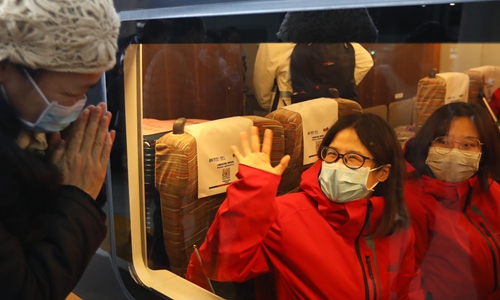HOME >> CHINA,SPECIAL-COVERAGE
Provinces help Hubei cities, show system's edge
By Zhao Yusha Source:Global Times Published: 2020/2/10 19:33:40
Mobilizing capabilities show system’s edge: analyst

The third national medical team of traditional Chinese medicine (TCM), consisting of 43 medical workers from the TCM system and leaders from the health commission of Jiangsu Province, leaves for Wuhan, Hubei Province to assist in medical treatment. Photo: cnsphoto
This was part of the "one province helps one city" policy to combat the coronavirus in Hubei.
It was put forward by Guo Yanhong, an official at China's National Health Commission at a news conference on Friday.
Those provinces and municipalities shall send medical personnel and resources to various Hubei cities.
A total of 41 chartered flights with medical groups composed of nearly 6,000 people nationwide, including Tianjin, Hebei Province and Sichuan Province landed in Wuhan on Sunday, marking the largest arrival of medical workers to the city since the novel coronavirus pneumonia outbreak, media reported.
Guo said that more than 11,000 medical personnel have been sent to Wuhan to help fight the virus as of Friday. But conditions in other Hubei cities like Huanggang and Xiaogan are deteriorating, with some becoming just as severe as Wuhan, the Xinhua News Agency reported. Those second-tier cities in the province lag behind Wuhan in medical resources and technology.
As of Monday, six Hubei cities recorded more than 1,000 confirmed infection cases.
Further details have not been revealed on how the policy's assistance system will operate.
Some netizens speculated it would also include transporting Hubei patients to other provinces for treatment.
Most netizens approved of the policy. Chinese social media have been flooded with heartwarming pictures and videos of the campaign.
Some netizens also resorted to an ancient Chinese myth wherein every member of the "dragon clan" gives their toughest scale to make the most impenetrable armor for one child. "We gave you our toughest scale. Stay strong, Hubei," netizens said.
A hospital in Shandong Province even made a Hubei dialect manual for their medical workers going to Hubei to overcome the language barrier, a Shandong newspaper reported.
Many were touched by some provinces willing to help despite also being hit heavily by the virus. For example, Jiangsu Province recorded 492 cases as of Monday, and was assigned to help Huangshi, a Hubei city with 805 confirmed cases.
"We applaud and are touched by the policy. People in Hubei thought they had been abandoned as we were rejected and treated differently since the outbreak. We are now seeing the outpouring of support from the whole nation, we see hope," said Yuan Lili, a resident of Huanggang, a Hubei city with 2,252 recorded coronavirus pneumonia patients.
The assistance campaign has even given rise to competition of offering help. Cities such like Qidong and Xuzhou in Jiangsu Province have also sent medical staff and resources to Jiangsu's designated city separately.
This is a vivid embodiment of how united people in China are when faced with difficulties, and also shows the superiority of China's ability to mobilize resources from the whole nation on short notice, said Wang Hongwei, a professor at Renmin University of China's School of Public Administration and Policy. He noted that such mobilization would be unimaginable in other countries.
Beijing and Shanghai were not assigned to help Hubei, which Wang believed is because with a large number of migrant workers, they face mounting pressure to contain the virus as those workers arrive for work in the next few weeks.
The same model was activated after the Wenchuan earthquake claimed almost 70,000 lives in 2008. Following the disaster, cities nationwide offered their assistance in reconstruction efforts for towns and villages that had been destroyed by the earthquake.
Newspaper headline: Provinces help Hubei cities
Posted in: SOCIETY